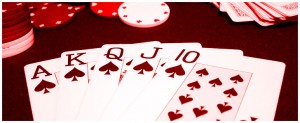Besides the basic three reasons to raise, there are a few other sub-reasons. Bluffing is perhaps the most obvious of these. If you do not have the best hand, but you want to create the impression that you do, a raise can sometimes get this done for you. For a bluff to be effective, you will want everyone to fold so that you can win the hand instantly, therefore, it makes sense that a bluff is most effective when there are only a couple people in the hand, and you have intuited that they have weak hands. This is when people at Bodog.com are most likely to give you the hand.
Another reason to raise is to get a free card. If you raise a bettor in an early round of wagering, they may check around to you during the next round of bets, enabling you to see the next card for free. This makes sense when you are in the last position. If you are in an early position, there will be action after your turn to bet or check, making getting the free card much more difficult.
The final reason why you may want to raise is to take away pot odds from people. If someone has a draw to a good hand and no one bets, they will be getting infinite pot odds, thus making their decision to stay in the hand very easy. But if you put in a large bet, their pot odds decrease dramatically, and they may have to fold in order to play correctly. Even better for you is when a drawing hand incorrectly calls your bet. Even though they may win occasionally, they will lose often enough to make it a worthwhile venture on your part.
 Suppose you are in a multi-table tournament and you make it to the last table. How should you alter your play to account for the potential prize money up for grabs? The first thing to consider is your chip value. Once you reach this stage, if the tournament is large enough, you are guaranteed prize money, but the amount will vary depending on the place that you finish. Obviously, you want to maximize your winnings, so you will need to adjust your playing strategy appropriately so you can stay alive in the tournament for as long as possible.
Suppose you are in a multi-table tournament and you make it to the last table. How should you alter your play to account for the potential prize money up for grabs? The first thing to consider is your chip value. Once you reach this stage, if the tournament is large enough, you are guaranteed prize money, but the amount will vary depending on the place that you finish. Obviously, you want to maximize your winnings, so you will need to adjust your playing strategy appropriately so you can stay alive in the tournament for as long as possible.


